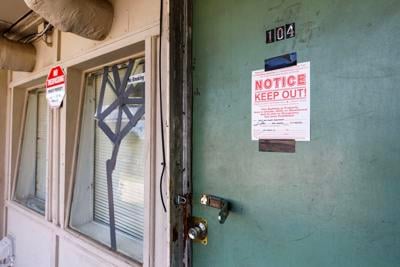COLUMBIA — In 2018, the Princeton Eviction Lab released a nationwide report on eviction filings that identified North Charleston and Columbia as having some of the highest eviction rates in the state.
The report was a wake-up call for officials and housing advocacy groups in South Carolina.
“A lot of organizations and entities came together,” said Glynnis Hagins, a law fellow at the NAACP based in Columbia. “The data revealed that eviction is a huge issue in South Carolina.”
New data made available following a federal court win for the NAACP gives the state its first comprehensive, county-by-county look at eviction filings, the first step in a landlord’s process to formally evict a tenant from their home.
Not much has changed since 2018, as the state still appears to be a hotspot, though not all states yet have data available. Over 400,000 evictions have been filed in South Carolina since March 2020.
The new data shows that it isn’t just the state’s largest metros experiencing the problem. In fact, filing rates, meaning the number of eviction filings per 100 households in a selected area, were highest in rural counties like Dillon, Cherokee and Dorchester counties:
- Dillon County: 37 percent
- Cherokee County: 31 percent
- Dorchester County: 29 percent
- Spartanburg County: 28 percent
- Marion County: 28 percent
Among the major metro areas, Richland County led in total evictions and its filing rate since March 2020:
- Richland County: 56,061 filings, 28 percent filing rate
- Greenville County: 49,448 filings, 19 percent filing rate
- Charleston County: 34,784 filings, 17 percent filing rate
- Spartanburg County 32,159 filings, 28 percent filing rate
Following the 2018 Princeton report, South Carolina’s NAACP chapter started organizing programs to assist people facing eviction and help them access legal representation they could afford.
The South Carolina Court Administration’s ban on automated data collection made identifying people facing eviction a challenge for the NAACP, as a method called data scraping was blocked by the administration.
The state’s ACLU chapter filed a First Amendment lawsuit against the South Carolina Court Administration on behalf of the NAACP in 2022, settling in September of last year and gaining access to the data earlier this year.
“The data being laid out like this promotes a sense of urgency, hopefully, and it spurs our elected officials to take action,” ACLU South Carolina director of communications Paul Bowers said. “It’s not something that we need to have on the back burner.”
Hagins pointed to the housing affordability crisis, a lack of well-paying jobs and municipalities and counties favoring higher-end apartment developments over affordable ones.
Census data shows that many renter across most South Carolina counties are cost-burdened, meaning over 30 percent of their take-home income goes toward living expenses.
In Calhoun and Fairfield counties, over 40 percent of the median renters household income goes toward rent, leaving less money to spend on essential goods like food, transportation and child care.
Because South Carolina doesn’t have a process to scrape evictions from a person’s record after a set number of years, evictions have long-lasting impacts on people throughout the state, explained Kenya Cummings, executive director of SC Housing Justice Network.
“There are folks that are professionals, that come to me all the time talking about an eviction they got when they were in college, and now they’re in their 40s but it’s something that they have to contend with,” Cummings said.
The housing organizations have been pushing for eviction right to counsel legislation for years — or pro bono legal representation for a tenant during the eviction process — but the efforts have yet to go anywhere.
“When folks are able to actually see data and have clarity that actually, not a lot has changed since the initial eviction lab report, then we can actually start to talk about a viable solution,” Cummings said.











